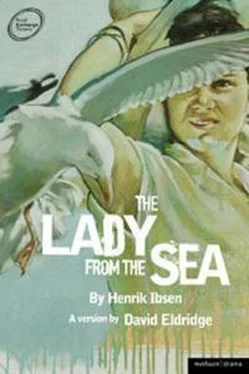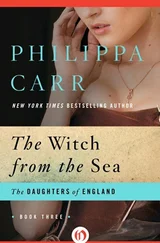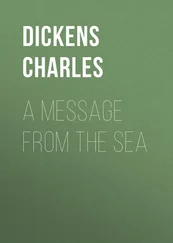Arnholm. Yes, believe me, it lies wholly and solely in your own hands.
Bolette. If only that were true! Will you perhaps put in a good word for me with father?
Arnholm. Certainly. But first of all I must speak frankly and freely with you yourself, dear.
Bolette (looks out to the left). Hush! don't let them notice anything. We'll speak of this later.
(ELLIDA enters from the left. She has no hat on, but a large shawl is thrown over her head and shoulders.)
Ellida (with restless animation). How pleasant it is here! How delightful it is here!
Arnholm (rising). Have you been for a walk?
Ellida. Yes, a long, long lovely walk up there with Wangel. And now we're going for a sail.
Bolette. Won't you sit down?
Ellida. No, thanks; I won't sit down.
Bolette (making room on seat). Here's a pleasant seat.
Ellida (walking about). No, no, no! I'll not sit down—not sit down!
Arnholm. I'm sure your walk has done you good. You look quite refreshed.
Ellida. Oh, I feel so thoroughly well—I feel so unspeakably happy. So safe, so safe! (Looking out to the left.) What great steamer is that coming along there?
Bolette (rising, and also looking out). It must be the large English ship.
Arnholm. It's passing the buoy. Does it usually stop here?
Bolette. Only for half an hour. It goes farther up the fjord.
Ellida. And then sails away again tomorrow—away over the great open sea—right over the sea. Only think! to be with them. If one could. If only one could!
Arnholm. Have you never been any long sea voyage, Mrs. Wangel?
Ellida. Never; only those little trips in the fjord here.
Bolette (with a sigh). Ah, no! I suppose we must put up with the dry land.
Arnholm. Well, after all, that really is our home.
Ellida. No; I don't think it is.
Arnholm. Not the land?
Ellida. No; I don't believe so. I think that if only men had from the beginning accustomed themselves to live on the sea, or in the sea perhaps, we should be more perfect than we are—both better and happier.
Arnholm. You really think that?
Ellida. Yes. I should like to know if we should not. I've often spoken to Wangel about it.
Arnholm. Well, and he?
Ellida. He thinks it might be so.
Arnholm (jestingly). Well, perhaps! But it can't be helped. We've once for all entered upon the wrong path, and have become land beasts instead of sea beasts. Anyhow, I suppose it's too late to make good the mistake now.
Ellida. Yes, you've spoken a sad truth. And I think men instinctively feel something of this themselves. And they bear it about with them as a secret regret and sorrow. Believe me—herein lies the deepest cause for the sadness of men. Yes, believe me, in this.
Arnholm. But, my dearest Mrs. Wangel, I have not observed that men are so extremely sad. It seems to me, on the contrary, that most of them take life easily and pleasantly—and with a great, quiet, unconscious joy.
Ellida. Oh! no, it is not so. The joy is, I suppose, something like our joy at the long pleasant summer days—it has the presentiment of the dark days coming. And it is this presentiment that casts its shadows over the joy of men, just as the driving clouds cast their shadow over the fjords. It lies there so bright and blue—and of a sudden.
Arnholm. You shouldn't give way to such sad thoughts. Just now you were so glad and so bright.
Ellida. Yes, yes, so I was. Oh, this—this is so stupid of me. (Looking about her uneasily.) If only Wangel would come! He promised me so faithfully he would. And yet he does not come. Dear Mr. Arnholm, won't you try and find him for me?
Arnholm. Gladly!
Ellida. Tell him he must come here directly now. For now I can't see him.
Arnholm. Not see him?
Ellida. Oh! you don't understand. When he is not by me I often can't remember how he looks. And then it is as if I had quite lost him. That is so terribly painful. But do go, please. (She paces round the pond.)
Bolette (to ARNHOLM). I will go with you—you don't know the way.
Arnholm. Nonsense, I shall be all right.
Bolette (aside). No, no, no. I am anxious. I'm afraid he is on board the steamer.
Arnholm. Afraid?
Bolette. Yes. He usually goes to see if there are any acquaintances of his. And there's a restaurant on board.
Arnholm. Ah! Come then.
(He and BOLETTE go off. ELLIDA stands still awhile, staring down at the pond. Now and again she speaks to herself in a low voice, and breaks off. Along the footpath beyond the garden fence a STRANGER in travelling dress comes from the left. His hair and beard are bushy and red. He has a Scotch cap on, and a travelling bag with strap across his shoulders.)
The Stranger (goes slowly along by the fence and peeps into the garden. When he catches sight of ELLIDA he stands still, looks at her fixedly and searchingly, and speaks in a low voice). Good–evening, Ellida!
Ellida (turns round with a cry). Oh dear! have you come at last!
The Stranger. Yes, at last.
Ellida (looking at him astonished and frightened). Who are you? Do you seek anyone here?
The Stranger. You surely know that well enough, Ellida.
Ellida (starting). What is this! How do you address me? Whom are you looking for?
The Stranger. Well, I suppose I'm looking for you.
Ellida (shuddering). Oh! (She stares at him, totters back, uttering a half–suffocating cry.) The eyes!—the eyes!
The Stranger. Are you beginning to recognise me at last? I knew you at once, Ellida.
Ellida. The eyes! Don't look at me like that! I shall cry for help!
The Stranger. Hush, hush! Do not fear. I shan't hurt you.
Ellida (covering her eyes with her hands). Do not look at me like that, I say!
The Stranger (leaning with his arms on the garden fence). I came with the English steamer.
Ellida (stealing a frightened look at him). What do you want with me?
The Stranger. I promised you to come as soon as I could—
Ellida. Go—go away! Never, never come here again! I wrote to you that everything must be over between us—everything! Oh! you know that!
The Stranger (imperturbably, and not answering her). I would gladly have come to you sooner; but I could not. Now, at last I am able to, and I am here, Ellida.
Ellida. What is it you want with me? What do you mean? Why have you come here?
The Stranger. Surely you know I've come to fetch you.
Ellida (recoils in terror). To fetch me! Is that what you mean?
The Stranger. Of course.
Ellida. But surely you know that I am married?
The Stranger. Yes, I know.
Ellida. And yet—and yet you have come to—to fetch me!
The Stranger. Certainly I have.
Ellida (seizing her head with both her hands). Oh! this misery—this horror! This horror!
The Stranger. Perhaps you don't want to come?
Ellida (bewildered). Don't look at me like that.
The Stranger. I was asking you if you didn't want to come.
Ellida. No, no, no! Never in all eternity! I will not, I tell you. I neither can nor will. (In lower tone.) I dare not.
The Stranger (climbs over the fence, and comes into the garden). Well, Ellida, let me tell you one thing before I go.
Ellida (wishes to fly, but cannot. She stands as one paralysed with terror, and leans for support against the trunk of a tree by the pond). Don't touch me! Don't come near me! No nearer! Don't touch me, I say!
The Stranger (cautiously coming a few steps nearer). You need not be so afraid of me, Ellida.
Ellida (covering her eyes with her hands). Don't look at me like that.
The Stranger. Do not be afraid—not afraid.
(WANGEL comes through the garden, from the left.)
Wangel (still half–way between the trees). Well, you've had to wait for me a long while.
Ellida (rushes towards him, clings fast to his arm, and cries out). Oh! Wangel! Save me! You save me—if you can!
Читать дальше












